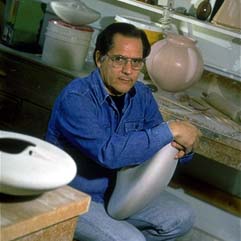“If I can see the beauty in my hand, if it touches my inner heart, and I can mold it into harmonious beauty, then I have met the challenge”
– Polingaysi
Timeless, elegant, sensuous, perfection, sublime, ancient and yet modern – are some of the metaphors used by collectors to describe Al Qöyawayma’s (otherwise referred to as Al “Q”) pottery. Nothing quite like Al’s pottery has ever existed before. As with Native traditions, his pottery tradition runs deep. Contemplative and studiously quite at times, at other times he is quite gregarious, especially when describing his passion for the clay and its heritage.
Al has travelled a rather circuitous path in arriving at this point in his creative life. Along that path he has acquired significant tools of modern knowledge, but at the same time maintained a profound appreciation of his cultural roots. This is sometimes a paradox to those who know him. Thoroughly a modern man, Al is equally at ease in today’s high tech and tribal worlds. He strives to maintain a balance between those two worlds.
Al credits his pottery style to his late Aunt Polingaysi Qöyawayma, better known as Elizabeth White, a diversified talent – educator, writer and potter. In 1966 while working with the clay Elizabeth said “you’ve got it”. Al notes: “That has always stuck with me”, even though at the time I wasn’t sure what I had”. By 1976 Al had entered the “Scottsdale National Indian Art Show” and as they say “the rest was history”. In the 1980’s Al showed jointly in Santa Fe with his relative Charles Loloma, to whom Al credits considerable influence and encouragement. In the highly charged markets of the 1980’s Al experienced instant sellout shows. Both Charles and Elizabeth related that it was their idea to use their backgrounds as stepping stones to project beyond all Indianisms, to blend tradition with contemporary expression. And, that is part of the philosophy behind Al’s pottery creations.
“My style tends towards that of a minimalist. I use the repousse’ technique on native clay to produce pieces of pristine, fluid form, with high sculptural relief. The finish is stone polished producing the hue and shadow of high desert landscape, and softness to the touch. I use many motifs such as ancient architecture, dancing figures, and icons such as corn, animal and feather designs. My clays are from Hopi. Through study of our ancient Sikyatki ceramics I’ve been able to closely reproduce an original clay. Using this clay and traditional coiling techniques allows me to construct complex, thin, lightweight forms.”
Sikyatki – Al explains that his Coyote Clan was the sole occupant of the ancient village of Sikyatki. Their origins, language, religion and traditions were different than the Hopi we know today. Sikyatki pottery is known for it’s low shouldered forms and intricate designs. Jesse Walter Fewkes of the Smithsonian excavated Sikyatki in 1895. Fewkes stated that”..In my judgement [Sikyatki ceramic art] is superior to any pottery made by ancient … Indians north of Mexico” With those roots it is perhaps only natural that Al’s ceramic creative skills should emerge.
It is Al’s grandmother, Sevenka, who passed down the families spiritual challenge: “We do not walk alone, Great Spirit walks beside us, always know this, and be grateful”. Al lives by that Grace and acknowledges the Creator’s hand in all parts of his life.
Al Qöyawayma
potter


